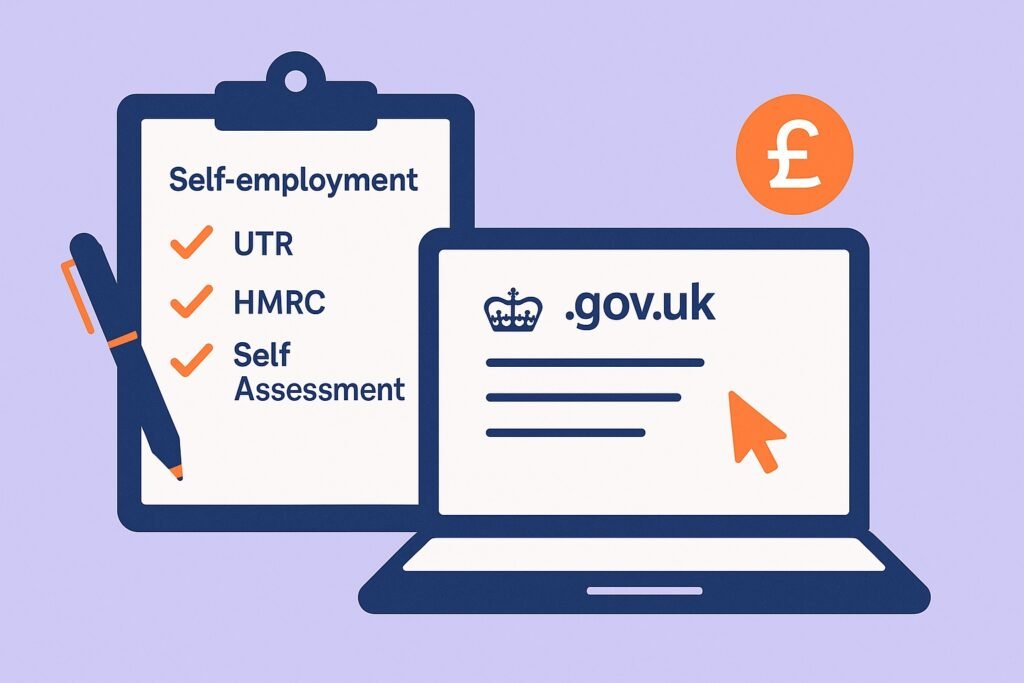
If you’ve decided to start working for yourself, one of your first legal responsibilities is to register with HMRC.
This guide explains when to register as self-employed, how to do so, and what happens next. It also includes answers to frequently asked questions and links to official sources.
What’s in this guide?
- What does it mean to be self-employed?
- When do I need to register as self-employed?
- How to register as self-employed
- What happens after I register?
- Key deadlines for self-employed individuals
- Frequently asked questions
- Summary
What does it mean to be self-employed?
You’re self-employed if you work for yourself and aren’t paid through PAYE (i.e. like an employee). This includes sole traders, freelancers, and gig workers.
You do not work under a contract of employment, and you are responsible for managing your own tax affairs.
This is different from running a limited company, where you act as both a director and an employee of a separate legal entity. As a sole trader, you and your business are legally the same, which means you’re personally liable for any debts or tax owed.
HMRC considers you self-employed if you:
- Run the business for yourself and are responsible for its success or failure
- Have several customers at the same time
- Decide how, when, and where you work
- Provide the equipment or tools you need for your work
- Can make a loss as well as a profit
For a full checklist of tasks to complete when going self-employed, see our guide: 15 steps to become self-employed
When do I need to register as self-employed?
You must register with HMRC if your total income from self-employment goes over the £1,000 trading allowance in a single tax year (6 April to 5 April). This threshold is known as the trading allowance.
Importantly, this allowance applies to gross income, not profit.
You must register by 5 October in your second tax year of trading.
Here are some examples:
- If you started trading in May 2026, you must register by 5 October 2027
- If you began in February 2026, you need to register by 5 October 2026
If you receive a notice from HMRC to complete a Self Assessment return, you must register even if you have not reached the £1,000 threshold.
How to register as self-employed
You submit your registration through HMRC’s Self Assessment system. You can register online, by phone, or by post, whichever suits you best.
1. If you’ve never filed a tax return before
Use HMRC’s online registration service for self-employment:
Once your registration has been submitted, HMRC will send you a Unique Taxpayer Reference (UTR) by post. You’ll also receive a letter with an activation code to access your online tax account.
2. If you’ve filed a return before but not as a sole trader
If you already have a UTR, you need to complete form CWF1 to let HMRC know about your new self-employment:
3. If you were self-employed in a previous life
If you previously registered as self-employed but ceased trading, you may need to reactivate your account.
You can do this by logging into your Government Gateway account. If you have any issues, don’t hesitate to contact HMRC.
What happens after I register?
Once registered, you have several duties:
- Keep accurate business records (income, expenses, invoices) – we recommend using accounting software.
- Submit a Self Assessment tax return each year
- Pay any tax and National Insurance you owe by the deadlines
HMRC will send you reminders for key deadlines. You can file your return online or on paper (if you choose), although paper returns have an earlier deadline and are being phased out.
For more details, see our guide: Self Assessment tax returns for the self-employed
Key deadlines if you’re self-employed
- 5 October: Deadline to register if you started trading in the previous tax year
- 31 October: Deadline to file a paper tax return
- 31 January: Deadline to file online tax return and pay tax owed
- 31 July: Deadline for second payment on account (if applicable)
Frequently asked questions
Can I register before I start earning money?
Yes. Many people register in advance if they are preparing to start work soon. There is no penalty for registering early.
Do I need a separate business name?
No. You can trade under your own name. If you choose to use a business name, you do not need to register it unless you form a limited company. Avoid names that imply that you are incorporated, such as “Ltd” or “Limited”.
Can I be employed and self-employed simultaneously?
Yes. It is common to be both employed and self-employed simultaneously. You will pay PAYE tax via your employer and report your self-employed income separately via Self Assessment.
Do I need to register for VAT?
Not necessarily. You must register for VAT if your taxable turnover exceeds £90,000 in a 12-month period. Otherwise, VAT registration is optional.
What if I only earn a small amount occasionally?
If your gross income from self-employment remains below £1,000 during the tax year, you don’t need to register. However, you may choose to register voluntarily to claim business expenses or build your National Insurance record.
Do I need a National Insurance (NI) number to register?
Yes. You’ll need an NI number before you can register for self-employment. If you don’t already have one, you can apply here:
Apply for a National Insurance number
Can I register a second business if I’m already self-employed?
You do not need to register again. You only have one UTR. You must keep separate records for each business, but include all income on a single Self Assessment return.
What if I don’t register on time?
If you fail to register by the deadline and owe tax, HMRC may charge penalties and interest. It’s best to register as soon as you become liable. See our guide to what happens if you register late.
Where can I get help?
You can contact HMRC directly or speak to a qualified accountant. GOV.UK also provides extensive guidance:
GOV.UK: Set up as a sole trader
Read our 15-step guide to becoming self-employed
A quick summary
- Registering as self-employed is a legal requirement once your income exceeds £1,000 per tax year (the trading allowance).
- The process is straightforward and can be completed entirely online.
- Make sure you register by 5 October in your second tax year to avoid getting on the wrong side of HMRC.
- Once registered, you are responsible for filing tax returns, paying tax and NICs, and maintaining accurate business records.



